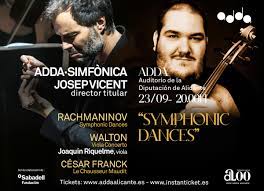The first concert of a new season prompts an air of expectation. A cursory glance of the program suggested nothing particularly special, excepting, of course, the anticipated and always delivered excellence of this orchestra, conductor and auditorium. Billed were a nineteenth century tone poem by an often-overlooked genius, a viola concerto, perhaps the best known in the repertoire and an ultra-late Romantic symphony in all but name, all pieces where familiarity, at least of style, suggested few surprises. How wrong can a concert goer be?
Cesar Franck’s Le Chasseur Maudit is, put simply, a painting in sound. Or perhaps it is film music without the film. It’s a tone poem, that abstract form that the nineteenth century invented to allow a composer to display aural emotional interpretation to project onto the scenes of a story. The very idea of the tone poem is Romanticism enshrined. Cesar Franck’s pictures are painted with broad, free brushstrokes, but in heavy paint which texture is the surface. The thick orchestration adds drama to the musical story, which was always vivid and clear, if a tad literal.
William Walton’s Viola Concerto followed with Joaquin Riquelme as soloist. Here the textures were light, the musical language suggestive of emotion, rather than the painting of pictures. In a beautifully reflective first movement, the soloist apparently is reading from a personal diary while the orchestra, here and there, adds its comment. The compositional skill is so great that this really is a conversation between soloist and orchestra, their contributions equal, their weights different.
There’s a real burlesque of a scherzo to follow and then perhaps an over-long finale that sometimes reaches for the grandiose, but memories of the first movement’s vulnerabilities always keep the music’s feet on the ground, while its upturned face searches for clouds.
Joaquin Riquelme’s playing was both virtuosic and quietly spectacular throughout. His sympathetic and informed interpretation of the substance of the piece was matched perfectly by Josep Vicent and the ADDA orchestra. At times, it seemed that the soloist was engaged in conversation with the orchestra, but it remained a conversation that was completely intelligible and never dominated by either party. The viola’s understated presence is very easily drowned by orchestral intrusions that are too loud and, apart from a couple of woodwind passages in the first movement, this trap was consistently and skilfully avoided. The audience reception was beyond rapturous. Joaquin Riquelme offered a contrasting encore, being an allemande from a Bach suite.
And then we met Sergei Rachmaninov, but the Rachmaninov from late in his life, at a time when he no longer needed to write music the merely pleased an audience. Not that he ever did! But his Symphonic Dances stand out from the rest of his orchestral writing in that they are more abstract, less prone to indulge in sugary sweetness.
On this occasion, the piece came across as autobiographical. Perhaps the intense rhythmic sound of the opening pages is a reference to the first symphony? This would explain why the rhythm disappears from view. There were passages that were reminiscent of the second piano concerto. There were others those seemed lifted from the second symphony. And, with such a big and varied orchestra, why did the composer include a solo piano part? Certainly, it was not to fill out the harmonies. Surely this is self-referential? And there was another section where the piccolo featured above percussion. Surely this was a memory of Petrushka? And what superb orchestral playing this was, coupled with precise and insightful interpretation that imbued every section of the peace with sense and meaning.
There were two encores, one unexpected, one almost the Adda signature tune. The slow movement from Dvorak’s New World is an unusual encore. but it did provide a superb contrast to the big sound that had preceded it. The Danzon number two by Marquez is now so familiar to the Adda audience that it is almost included de rigueur. But superbly so. Two lollipops of quite different flavours.
But without doubt, the Walton Viola Concerto and Joaquin
Riquelme’s stunning performance will live long in this concert-goer’s memory.





